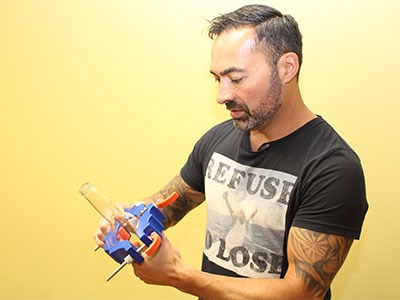Thanks to a good idea and a lot of perseverance, a Sudbury entrepreneur was able to change his life for the better.
In 2012, when the crowdfunding website Kickstarter was still a novel concept, Patrick Lehoux decided to test the waters of public opinion online and see if he could receive funding to put a prototype to market.
After a lot of brainstorming, he decided to build a bottle cutter that would allow users to create their own custom glassware out of their favourite brands.
Bottle cutters had been around since the 1970s, but Lehoux believed his design, which he eventually called the kinkajou, simplified the process to make bottle cutting an accessible pastime for anyone.
The product is named after the kinkajou, a small mammal native to the rainforests of South America, that is around the size of a cat but has four oversized teeth.
Lehoux’s bottle cutter has its own oversized tooth in the form of a small metal wheel that scrapes a circular line around any bottle.
Pouring hot and cold water over the scratch line breaks the bottle apart in two perfect halves. With sandpaper one can round the glass’ edges to make it perfectly safe for drinking.
Lehoux’s 30-day Kickstarter, which ended July 8, 2012, exceeded his expectations and raised more than $80,000
Through the Kickstarter campaign he got in touch with an American who had lived in China for 18 years, and offered to help him manufacture his products.
“Originally when I launched my Kickstarter I was going to have this made in the U.S.,” Lehoux said. “I didn’t know anyone in China.”
But through his new business contact he was able to take advantage of China’s established manufacturing base to build the kinkajou and other products by his company, Bottle Cutting Inc.
The parts for the kinkajou are actually assembled in seven separate plants in China.
“My overhead is extremely low and my margins are super high,” Lehoux said. “Higher than any business I’ve ever had.”
Once the units are built, they are transported to Atlanta, GA., where Lehoux deals with a fulfilment company which ships his products directly to customers around the world.
Lehoux sells the kinkajou and his other bottle-cutting products directly through his website – www.bottlecutting.com – and through Amazon. He in the process of negotiating with Europe’s seven Amazon sites to carry his products.
To date, he has sold bottle-cutting products in more than 70 countries, and has generated around $4 million in revenues.
“At the growth rate we’re seeing, within five or six years this will be a $10-million company,” he said.
Most of his sales are in the United States, with less than 0.5 per cent in Canada.
Around half of his Facebook page’s 100,000 subscribers are from the Philippines, and he said he’s working out a deal to carry his products in more than 100 stores in the southeastern Asian country.
Lehoux said now that it has firmly established itself in the marketplace his globalized business has remained relatively hands-off.
“If I sell 100 units during this conversation I don’t have to do anything,” he said. “It just happens.
“All my other businesses, I felt like I was working 80 hours a week just trying to make things happen. I’ve taken a very different approach with this one, and I try to work as little as possible.”
Lehoux said he is now able to run his business working only 10 hours per week.
With his free time he has been able to travel, pursue his hobbies, such as playing the guitar, and giving back to other entrepreneurs who may just be starting out.
For the past two years, he said he has tried to meet with at least one entrepreneur per week over Skype.
They chat for an hour or two about the person’s ideas, and their approach to their business.
Lehoux said the biggest hurdle young entrepreneurs face is following through with a great idea.
They either lose interest or let life get in the way, and they eventually forget about the business altogether.
“If every day you’re touching your project and making progress, as long as it’s actively in your life every day, you’ll get there,” he said.
One entrepreneur he mentored early on was able to leave a job at big box retailer to pursue an idea for a wine rack on Kickstarter.
He has since made millions selling his units and was able to buy a condo in downtown Vancouver.
New entrepreneurs can also get phased by early criticism.
“It’s funny how we’re easily influenced by what people think, and we really shouldn’t be,” he said.
When he first proposed his Kickstarter in 2012, he faced a lot of criticism online but ignored it and let the market decide whether or not his business was worthwhile.




